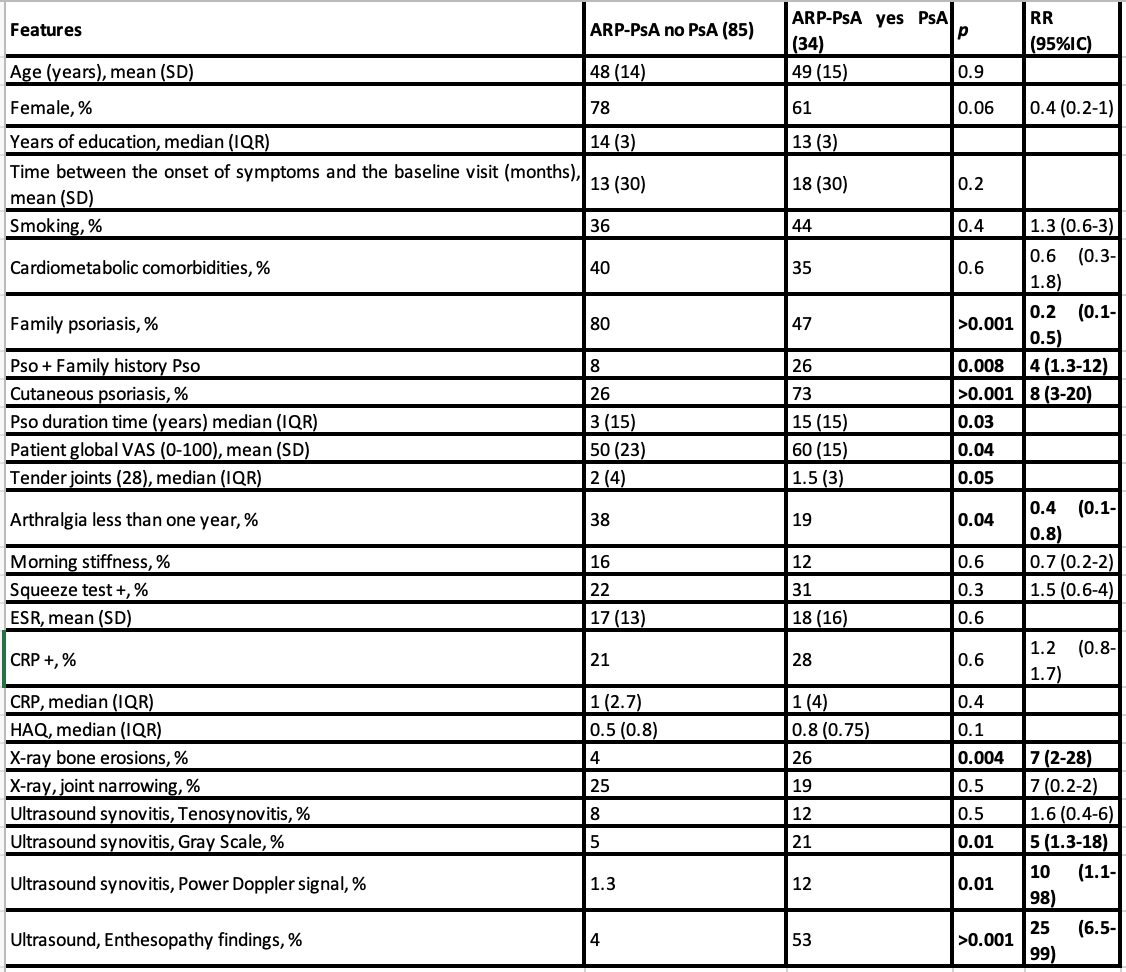Session Information
Session Type: Poster Session A
Session Time: 9:00AM-11:00AM
Background/Purpose: The psoriasis- to- psoriatic arthritis (PsA) transition offers a unique opportunity to identify individuals at increased risk of developing PsA and to implement preventive strategies. Objectives: To estimate the frequency of arthralgia with risk of progression to PsA (ARP-PsA) in a large cohort of patients and to estimate the incidence of PsA at one year in ARP-PsA patients analyzing clinical, laboratory and imaging predictor variables.
Methods: Prospective cohort study, include patients over 18 years of age who were admitted consecutively for arthralgias, to the ¨Reuma-check¨ program. In this, the baseline included: laboratory, X-rays, ultrasound (US) with power Doppler (PD) and clinical interview. Sociodemographic data, clinical and clinimetry (global VAS, joint count, HAQ) were collected. Each evaluator (laboratory, imaging and clinical) were blinded to the data of the other studies. Presence of psoriasis (Pso) and family history (FH) were investigated. Patients with previous diagnosis of PsA were excluded. The ARP-PsA was defined as those patients with arthralgia plus Pso and/or FH. This group was evaluated at one year to estimate if they developed PsA. Statistical analysis: descriptive statistics, Chi2 test, Fisher’s exact test, Student’s T test and Mann Whitney was performed. A multivariate logistic regression: dependent variable the final diagnosis of PsA at year.
Results: A total of 1419 patients with arthralgia were included between July 2017 and March 2022, 8.4% (95% CI: 7-10) met ARP-PsA criteria. Of these 119 patients 34 developed PsA at 1 year (29%, 95%CI: 20-37). The clinical, laboratory and imaging characteristics between ARP-PsA patients who did and did not develop PsA are shown in table 1 (univariate analysis). Of the ARP-PsA patients who had only Pso (n 32), only family history (n 70) or both combine (n 17) developed PsA at 1 year: 57%, 11% and 53% respectively. Longer duration of psoriasis was associated with the development of PsA: median years:15 vs 3. In multivariate analysis, the predictor variables for progression from ARP-PsA to PsA at one year were: combination of Pso plus FH (OR: 32; CI 95%: 1.2-1026), synovitis by PDUS (OR: 31; CI 95%: 1.1-967), US enthesopathy findings (OR: 470; CI 95%: 13-1600) and tender joint count (OR 0.2 CI95% 0.05-0.6).
Conclusion: The frequency of patients at risk of progression to PsA (arthralgia plus PsA and/or FH) in our cohort was 8.4%, of whom 29% developed PsA at 1-year follow-up. The main predictor variables were US findings (synovitis and enthesopathy), as well as the combination of Pso plus FH, a lower number of tender joints, and a longer duration of the Pso.
To cite this abstract in AMA style:
garcía salinas r, Mareco J, Ruta S, PEREZ R, Almada F, Magri S. Arthralgia with Risk of Progression to Psoriatic Arthritis in a Large Cohort of Patients: Role of Ultrasound [abstract]. Arthritis Rheumatol. 2023; 75 (suppl 9). https://acrabstracts.org/abstract/arthralgia-with-risk-of-progression-to-psoriatic-arthritis-in-a-large-cohort-of-patients-role-of-ultrasound/. Accessed .« Back to ACR Convergence 2023
ACR Meeting Abstracts - https://acrabstracts.org/abstract/arthralgia-with-risk-of-progression-to-psoriatic-arthritis-in-a-large-cohort-of-patients-role-of-ultrasound/

